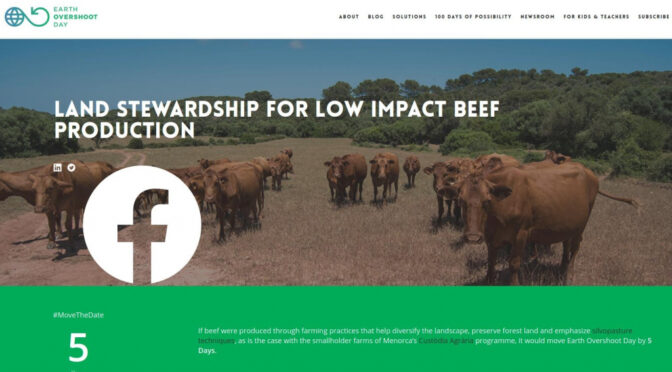Views: 1160
Just three months ago on 29 July, we entered a global ecological deficit. It was called the Earth Overshoot Day 2021. That means that all the resources that we have consumed in the world since that date cannot be regenerated and we are going into the accumulated natural reserves that are diminishing at an alarming rate. It also refers to the pollution produced that cannot now be absorbed into the biosphere.
That organisation that annually calculates when Overshoot Day is reached has chosen 100 initiatives for the entire world that can help delay the date. The solution that they proposed is one that we promote from GOB: the Land Stewardship Scheme.
Specifically, a study has been done on the ecological footprint from the production of beef in the Land Stewardship Farms. They have taken into account factors such as the type of food given to the cattle – if produced on the same farm or, if imported, the distance covered; if the cows are out to pasture or are in cattle sheds etc; the energy resources consumed by the farms – electricity, fuel- and the use of fertilizers amongst other things.
The result has been that the production of beef on Land Stewardship Scheme farms has an ecological footprint up to 64% less than the national average. This is a really significant difference that comes from two factors.
The first factor is the resources consumed with each type of production and the associated pollution. To produce a kilo of beef from the Land Stewardship Scheme requires 15% less in financial resources than that required by conventionally produced meat. This contradicts the theory that to produce organic meat extensively is more costly than by intensive farming.
The second factor is the Land Stewardship Scheme itself. It is that much of the land for the Land Stewardship Scheme would not be considered by conventional farming as giving optimal production value. Land Stewardship farms take advantage of the mosaic landscape that combines cultivated land with areas of wild vegetation for agricultural production. The livestock eats partly from wild pasture roaming through wooded areas and scrubland. Furthermore, this type of management does not deplete the biodiversity but rather encourages it.
In this way, the consequence is not only the kilo of meat that is produced but also there are additional positive results such as the capture of carbon coming from the vegetation of the managed areas.
As consumers, all of us have the possibility to encourage the type of food that respects the ability of regenerating the World. Bear this in mind when you go shopping.
You can consult the available products of the Land Stewardship Scheme sold direct on https://www.gobmenorca.com/productescustodia. You can learn more about the program by watching the videos listed on our You Tube Channel.
You can see news on the Global Footprint network website.
The calculation of the ecological footprint for the production of beef has been possible thanks to the economic support of the MAVA Foundation within the Foodnected project.


One thought on “Land Stewardship Scheme as a solution”
Comments are closed.